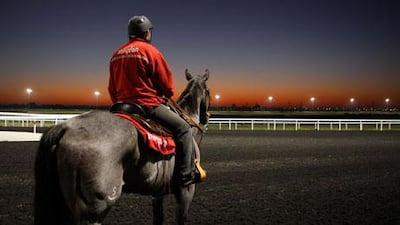When Martin Talty was young, his first trip to a racecourse was to Rosehill in Sydney, Australia. Talty made the visit not to watch the horses, but to hunt out the colour televisions there, as they were the only ones he could get access to.
His trips to the track eventually led him to his current role as international racing manager at the Dubai Racing Club, a position where his natural inquisitiveness certainly helps in his quest to entice the world's foremost equine stars to Meydan Racecourse for the Dubai World Cup Carnival.
This year, he has among his targets two Australian superstars, Sepoy and Black Caviar.
In the bank already is Sepoy, trained by Peter Snowden and owned by Sheikh Mohammed bin Rashid, Vice President of the UAE and Ruler of Dubai. The four-year-old has been beaten only once and Snowden has been persuaded to race in Dubai as a stopover on his way to a European campaign.
Talty would like to match the quadruple Group 1 winner against Black Caviar, the world's best sprinter who remains unbeaten in Australia.
Australians wanted the clash to take place at home, but the Ascot racecourse has lured the pair for the royal meeting and Talty is desperate to get in first for what would surely be dubbed the Duel in Dubai.
"I think every racecourse in the world would love to have a race like that and it would be on her way to Royal Ascot," Talty said. "We at the DRC are like every racing club in the world and we are doing our utmost to get Black Caviar here."
Black Caviar is equally adept at running over 1,000m and 1,200m so presumably could run in either the Al Quoz Sprint or the Dubai Golden Shaheen on World Cup night, March 3.
It is here, however, that the Dubai Racing Club has played its trump card. The Golden Shaheen this year became the first race in the UAE to be accepted into the prestigious Global Sprint Challenge (GSC).
The series offers a US$1 million (Dh3.67m) bonus for winning three races on different continents and Black Caviar is slated to run in the Group 1 Lightning Stakes at Flemington racecourse in February, the first race of the series.
Talty is still hoping the Al Quoz Sprint will also be accepted into the series, but as the GSC has five sprints down a turf straight already, his task is a stiff one.
Since midsummer Talty has been fine-tuning the Carnival programme for which hundreds of thoroughbreds will come to Dubai to compete for the next 10 weeks, culminating in the World Cup card that carries total prize money of $27.25m.
With the application forms now in, the 100 boxes in the International Stables at Meydan are already half filled, with a shipment of around 50 horses to follow on Saturday.
Racing in Dubai is competitive, but before even a starting gate has opened connections have to fight to get to the top of Talty's in tray.
"We are getting the same sort of horses over the past few years but the quality is increasing," he said. "We had 360 applications for this year's Carnival and we accepted 220. Some of those go on the pending or reserve list and some of those are from countries like Brazil, South Africa and Bahrain with whom we do not have direct import status and quarantine, so they can't come."
It is a huge operation, and one that has mushroomed in the seven years since the Carnival's inception. Talty had only a few months in 2003 to organise the inaugural Carnival the following year and he was happy when 103 international horses turned up. Last year that figure had almost doubled to 200.
Coming to Dubai has been made easier by the generous subsidies offered to trainers and owners, some of whom may never have dreamed of racing internationally. It has given them an opportunity to compete in races and for prize money they would not normally have thought possible.
"The hardest thing was to drill into trainers that we had subsidies," Talty said.
"They could not believe the subsides on offer. We subsidise horse transport, provide half-board accommodation for stable staff for the duration of their stay and the weather here beats mucking out stables in places like Newmarket in England. It couldn't happen anywhere else in the world."
Neither could the installation of Meydan's 110m colour LED screen, the world's longest, that occupies the home straight. Talty will never want for a colour television again.
Follow
The National Sport
on
& Geoffrey Riddle on

